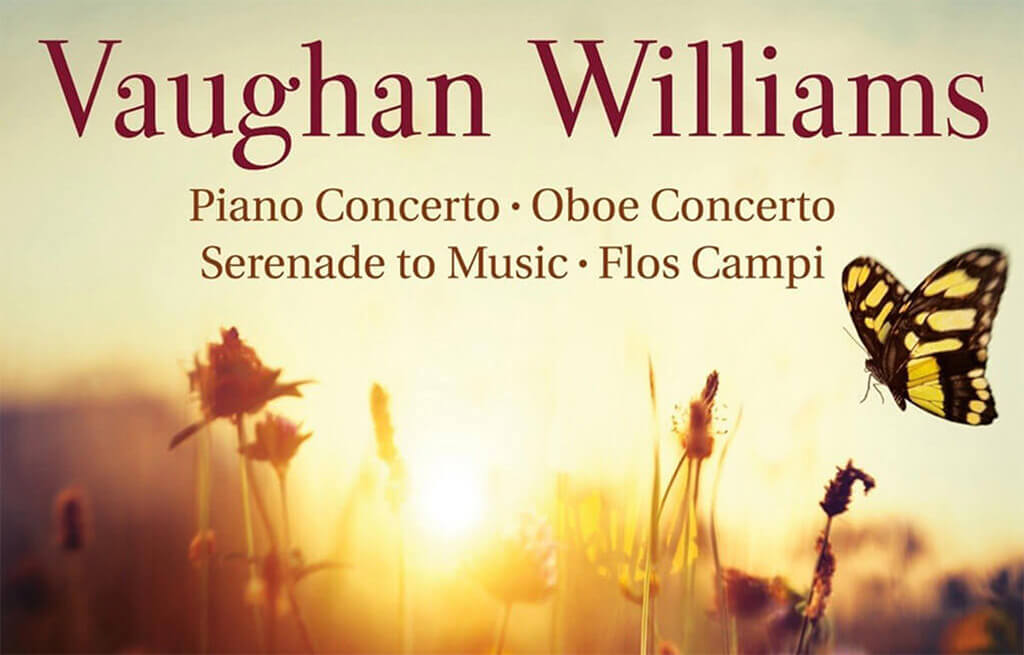
Vaughan Williams: Piano Concerto. Oboe Concerto. Serenade to Music. Flos Campi. Louis Lortie, piano. Sarah Jeffrey, oboe. Teng Li, viola. Carla Huhtanen, sop. Emily D’Angelo, mezzo-sop. Lawrence Wiliford, ten. Tyler Duncan, bar. Elmer Iseler Singers (Lydia Adams, director). Toronto Symphony Orchestra/Peter Oundjian. Chandos CHSA 5101. Total Time: 82:21.
It is always a special delight to “discover” a new piece of music. After a lifetime of playing and listening to music, I had never had occasion to encounter Vaughan Williams’ Concerto for Oboe and Strings, either in concert or on a recording. Yes, several recordings of the piece have been produced over the years, but none had ever come my way, nor had I sought one out. My loss, it turns out.
From the opening bars of this new recording of Vaughan Williams’ Concerto for Oboe and Strings, I was mesmerized by the beauty of the composer’s creation in a genre which has far too few really outstanding pieces. The Mozart and Richard Strauss concertos come to mind, and then? This well-planned and well-reproduced CD also has three other fine Vaughan Williams pieces to commend it. All in all, a notable release, not least of all because it is Peter Oundjian’s last recording as music director of the Toronto Symphony Orchestra (TSO).
Kudos to oboist Sarah Jeffrey, whose glorious sound, technique and stamina help bring this gorgeous piece to life. A native Torontonian and principal oboe of the TSO since 2005, she played with several other Canadian orchestras before joining the TSO and becoming one of its greatest assets. Vaughan Williams’ Oboe Concerto opens with an exuberant solo passage which takes the instrument from the very bottom to the very top of its range. Whereas some oboists struggle to get more than an ugly honk out of the low notes, Jeffrey makes each one a thing of beauty. And her top notes are remarkably secure and full-throated. Vaughan Williams’ default mode was always smoothly flowing pastoral lines; that is certainly the case here, and this style of writing is also ideal for the instrument. But toward the end of the last movement, the composer tosses in a brilliant staccato flourish that seems at odds with the style of the rest of the piece. Perhaps he should have done more with this idea for the sake of contrast. That said, this is a fine piece that deserves to be played more often.
The same could be said of Vaughan Williams’ Piano Concerto in C major. Not known for his piano music, his writing for the instrument tends towards block chords and percussiveness. The slow lyrical movement in this piece, however, feels quite different, almost improvisational. This is hauntingly lyrical writing for the piano with some lovely wind solos added from time to time along the way. He adds a hard-nosed chromatic fugue in the third movement – Busoni and Hindemith come to mind here – before ending the piece with a waltz.
The Piano Concerto was written to be played by Harriet Cohen, who gave the first performance in 1933. Cohen had such difficulty playing it that Vaughan Williams was persuaded to allow the piece to be reworked by Joseph Cooper as a concerto for two pianos. For this new version, he provided a meditative cadenza for the final bars. As it happens, just last year Chandos gave us a new recording of the version for two pianos featuring Louis Lortie and Hélène Mercier (CHSA 5186). Canadian pianist Louis Lortie is also the piano soloist in this current recording of the single piano version. Not the original version, this current version incorporates that final cadenza the composer added in 1946. In both recordings, Lortie plays superbly and convinces me that the solo piano version stands up perfectly well. In fact, I prefer the solo piano version, especially in the Romanza slow movement and in the final bars.
Vaughan Williams’ Serenade to Music is a setting of lines from Shakespeare’s play The Merchant of Venice. In its original version, the composer set the lines for sixteen solo voices with orchestra, and had particular singers in mind for each part. A unique composition in this form, it is often trotted out for special occasions, and never fails to have an uplifting effect on both performers and audiences. This new recording uses a version for four solo voices, chorus and orchestra. Although beautifully executed, it lacks the special qualities of the original version.
Flos Campi (Flower of the Field), a love song expressed through the voices of two lovers, is a piece in six movements inspired by the Song of Songs or the Song of Solomon, with a Latin quotation from the Song of Songs at the head of each movement The scoring for solo viola, chorus and small orchestra is quite unusual. Rather than singing text from the Song of Songs, the chorus instead provides wordless singing. Vaughan Williams’ writing for the chorus is remarkable, and the Elmer Iseler Singers give his often ecstatic outbursts both passion and beauty of sound. Whereas in a live concert, it is always a tricky matter to balance a solo viola with an orchestra because its mid-range register and dark sound tend to be easily covered, this is not a problem on a recording; Teng Li’s Amati viola comes through with impressive eloquence.
In sum, this is a fine collection of mostly unjustly neglected pieces in first-class performances by some of our finest artists.
Vaughan Williams: Concertos (Chandos) is available at Spotify, iTunes and amazon.ca.
- SCRUTINY | TSO Lets Berlioz Do The Talking In Season Opener - September 21, 2018
- RECORD KEEPING | Even Yannick Nézet-Séguin Can’t Make Us Love Mozart’s La Clemenza di Tito - September 6, 2018
- RECORD KEEPING | Giovanna d’Arco With Anna Netrebko Explains Why The Best Operas Survive - August 30, 2018



